The UK and the US, separately, announced new aid for Yemeni women and children, amounting to about $228 million.
UN announced that more than 5 million women in Yemen suffer from limited or no access to reproductive health services, including 1.5 million pregnant women who suffer from acute malnutrition.
The British Foreign Office announced a $205 million new healthcare support to vulnerable women and children in Yemen.
In a statement, the ministry said that the four-year aid program provides health care for about one million children and women annually, providing primary health care, including nutrition, water hygiene and sanitation, and sexual and reproductive health services, to some of the most vulnerable in Yemen.
The statement quoted Foreign Secretary James Cleverly as saying: “The conflict in Yemen continues to cause pain and suffering for millions of ordinary Yemenis, with women and children particularly paying a heavy price.”
The minister added that the UK remains committed to tackling the humanitarian crisis in Yemen, and the new Yemen Women and Children Program will deliver vital support to the most vulnerable.
The US Agency for International Development (USAID)’s Bureau for Humanitarian Assistance (BHA) contributes $23.4 million to the United Nations Population Fund (UNFPA) to provide emergency relief and life-saving reproductive health and protection services to 1.3 million of the most vulnerable women and girls in Yemen.
The Fund stated, in a statement, that the funding will allow UNFPA to provide an integrated package of reproductive health, protection, mental health, and psychosocial support services in 14 hospitals and four mobile health clinics.
Twenty women and girls’ safe spaces will be supported to provide psychosocial care, livelihood opportunities, and referral for legal aid and medical services.
The new funding will also help the delivery of immediate, life-saving supplies to families on the move as they flee conflict or natural disasters through support to the UNFPA-led Rapid Response Mechanism.
The UNFPA’s Representative in Yemen, Enshrah Ahmed, indicated that the needs of women and girls in Yemen are vast and urgent.
“This generous contribution will enable UNFPA and its partners to continue safeguarding the health and well-being of women and girls in surviving one of the world’s largest humanitarian crises,” she said.
The UN Fund confirmed that more than five million women and girls of childbearing age have limited or no access to reproductive health services, among them, 1.5 million pregnant women are acutely malnourished.
UNFPA requires US$40 million over the next five months to fund its life-saving response for women and girls' reproductive health and protection in Yemen.









